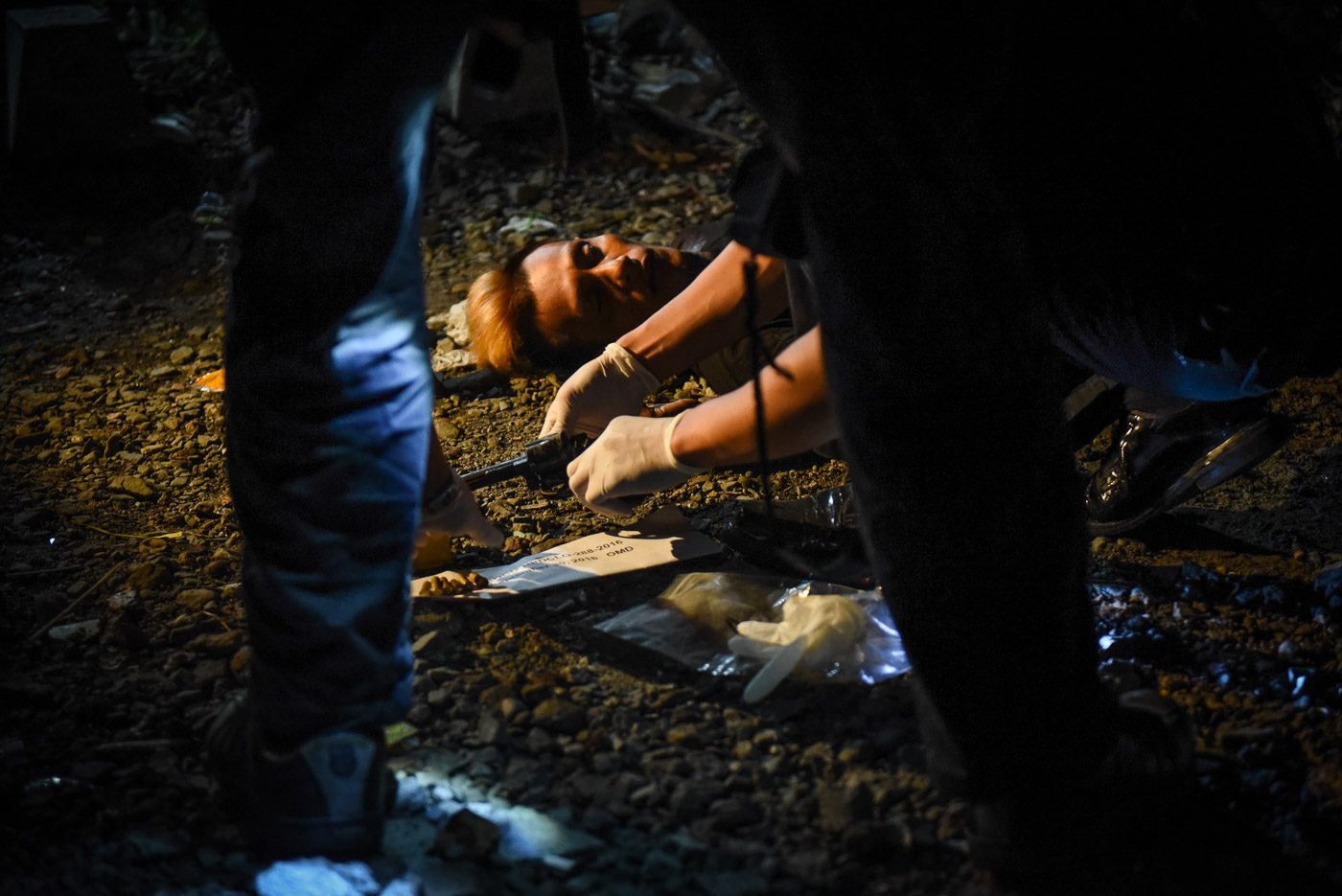SUMMARY
This is AI generated summarization, which may have errors. For context, always refer to the full article.

MANILA, Philippines – In a fresh attempt to dispel assertions that President Rodrigo Duterte’s remark on extrajudicial killings is an admission to a crime, Presidential Spokesperson Harry Roque said there is technically no such crime as “extrajudicial killings” in the Philippines.
“I’d like to emphasize that there is actually no crime under both domestic law or international law as ‘EJK.’ In fact, this is a misleading term because killing in our Constitution and in our laws is never legal, so there is no such thing as extrajudicial killings…. So it’s either a lawful killing or an unlawful killing,” said Roque on Monday, October 1.
“Did he [admit to murder]? Not by virtue of the context of what he said. As I said, there’s even no crime as EJK. It’s a misnomer because, you know, there can never be judicial killings in this country because we have done away with the death penalty,” Roque also said.
He was addressing claims by some – including Senator Antonio Trillanes IV and law professor Tony La Viña – that Duterte’s remark can strengthen the two complaints against him lodged with the International Criminal Court (ICC) on his bloody campaign against illegal drugs.
Critics said the President’s words are as good as an admission and are consistent with his previous statements where he boasted about killing thousands.
‘Legal obfuscation’
The presidential spokesman, who had in fact lobbied for the Philippines to join the ICC and once called Duterte a “self-professed murderer,” appeared to focus on the complications surrounding the term “extrajudicial killings.”
But by claiming that such a term is not explicitly used in Philippine criminal laws and therefore Duterte could not have admitted to it, Roque is only muddling the issue, said La Viña, who teaches human rights and public international law.
“That is legal obfuscation. I do not think Duterte made an admission on the technical meaning of EJKs in the Philippine legal system but its generic, broader sense. This latter sense is also the international meaning and the one more consistent with crimes against humanity, according to the Rome Statute,” La Viña told Rappler.
The Philippines adopted a definition of “crimes against humanity” when the Philippine Act on Crimes Against International Humanitarian Law, Genocide, and Other Crimes Against Humanity” (Republic Act No 9851) was passed in December 2009.
The law’s definition of crimes against humanity includes “willful killing” “when committed as part of a widespread or systematic attack directed against any civilian population.”
Roque even admitted that a Philippine law exists penalizing crimes against humanity, tacitly saying EJKs, which Duterte referred to, is covered and thus there is no basis for ICC to acquire jurisdiction over the complaints against the President.
“I reiterate because of the principle of complementarity, the ICC can only have jurisdiction if our courts, our prosecutors are unable or unwilling to exercise jurisdiction. We have a domestic statute also penalizing crimes against humanity and therefore it is incumbent upon the complainants to show that the Philippine judicial system, the Philippine justice system, is simply not working,” said Roque.
EJK in jurisprudence
But the term “extrajudicial killings” has been used in Philippine jurisprudence, showing the concept exists in Philippine legal thinking.
Lawyer Romel Bagares of CenterLaw said the Supreme Court “addressed EJKs in its annotations on the Writ of Amparo and the case of Manalo v Secretary of National Defense.”
The Manalo vs Secretary of National Defense decision provides this definition of extrajudicial or extralegal killings: “Extralegal killings are killings committed without due process of law, i.e. without legal safeguards or judicial proceedings.”
The writ of amparo was created precisely to address extrajudicial killings. The writ of amparo is a legal remedy for persons whose rights to life, liberty, or security are violated or are threatened with violation by an unlawful act or omission of a public official or private entity.
“On October 24, 2007, the Court promulgated the Amparo Rule in light of the prevalence of extralegal killing and enforced disappearances,” reads the decision.
Even without the term’s use in Philippine criminal law, those guilty of extrajudicial killings can be punished on the basis of the Revised Penal Code’s penalties for murder and Anti-Enforced or Involuntary Disappearance Act, aside from RA 9851, said Bagares. Which law will apply will depend on the specific circumstances of the crime.
Much ado has been made about the term “extrajudicial killings.”
In October 2017, the Philippine National Police (PNP) caused a stir when it said there was only one case of EJK under the Duterte administration because of the PNP’s definition of what counts as EJK.
The PNP relies on the definition of the term in a Benigno Aquino III-time administrative order which created an inter-agency committee on extra-legal killings and other human rights violations.
The PNP said the order defines EJKs as killings committed by “state and non-state forces” to silence, “through violence and intimidation, legitimate dissent and opposition raised by members of the civil society, cause-oriented groups, political movements, peoples and non-governmental organizations, and by ordinary citizens.”
But the Commission on Human Rights countered that the UN definition includes “any killing by government forces as well as killings by any other groups or individuals which the government fails to investigate, prosecute, and punish when it is in a position to do so.”
The House committee on public order and safety, taking its cue from the police, also dropped the use of the term “extrajudicial killings,” preferring to use the term “deaths under investigation.” – Rappler.com
Add a comment
How does this make you feel?
There are no comments yet. Add your comment to start the conversation.